
Hub Coworking Expands to Entrepreneurs Sandbox
Cofounder Nam Vu looks back at the pandemic and shares his bright vision for the remote-work future.
Hub Coworking Hawaii, which set up its prototype location in 2014 and eventually opened Hawaii’s largest coworking space in 2017, has been selected by the Hawaii Technology Development Corporation (HTDC) as its new partner in operating the Entrepreneurs Sandbox.
Hub Coworking succeeds BoxJelly, the founding coworking partner at the Sandbox since it opened in 2019.
Co-founded by husband-and-wife entrepreneurs Nam and Meeta Vu, Hub Coworking was initially part of the global Impact Hub network but went independent in June 2020, just as the pandemic took hold. The pandemic also scuttled plans for a Hawaii Kai location which was to open that same month.
The pandemic was both an extinction-level event for the coworking industry (preceded by the very messy collapse of former VC darling WeWork), and an incredible opportunity to the players that survived. I was happy to report that BoxJelly was able to adapt, and that Hub Coworking actually expanded into Waikīkī.
I’ve been following the coworking movement since 2011, and Hub Coworking’s long journey: from a 5,000-square-foot semi-industrial space on Keawe Street, through a corporate incubation phase downtown, to its state-backed, long-in-the-making 14,000 square foot space on Queen Street in Kaka‘ako in 2017. They expanded to the second floor to manage another 4,000 square feet in 2018. The addition of the 2,500-square-foot space in the International Market Place in Waikīkī last year greatly diversified Hub Coworking’s clientele.
But the addition of the Entrepreneurs Sandbox coworking and event space—about 4,500-square-feet of the ground floor of the 13,500-square-foot facility—is a significant step. And as Nam Vu tells me, he’s got a lot more planned.
Coworking and the new new future of work
“I think that there's gonna be another migration,” Vu says.
Emerging from the pandemic—with the caveat that not everyone agrees we have—office dwellers everywhere rejoiced at the shift to remote work and working from home. And the appeal of a 30-foot commute and the ability to attend meetings without shoes (or even pants) is undeniable. But Vu suspects a second reckoning is coming, where the much ballyhooed “future of work” turns out to have been a shift from one extreme to another, requiring still more balance.
“There are some people who aren’t social beasts, they’re fine being locked in a room and you slide a pizza under the door and they’re good,” he laughs. “And it's definitely great sometimes, right? I stay home too because when I come in I get distracted—I work one day a week in Waikiki where most people don’t even know who I am and that gives me more of my focus time.”
But he also came to appreciate what was missing when he worked in isolation.
“I think that as humans, we are social beasts, and the majority of us like to have some kind of interaction, even if it's just sitting at your desk and seeing people around you,” Vu says. “Without having inputs, and without having someone that I can kind of banter with and throw out an idea, I'll have billion-dollar ideas on a daily basis… but it's not until I pitch it to someone that anything will come out of it.
“I think that innovation stagnation is real, if you don't have inputs and outputs from other people,” he adds. “I think that more and more people will find that as we go through this changing workplace—maybe after three or four years is when you're gonna hit that wall—that they’re just doing the daily thing, and not being creative anymore.”
Of course, you can find other people at a coffee shop. What does a dedicated coworking space bring to the table?
“What we've found over the years is that we were becoming a replacement for company culture for some folks,” Vu observes. “If people are working remotely, they no longer have the benefit of company picnics, volunteer activities, other opportunities to interact and bond.”
Hub Coworking hosts a wide diversity of events to both keep things interesting and to appeal to the widest audience.
“We have yoga, we have meditation, last night we had a jam session so people just brought instruments and played, and we have ‘Stories Out Loud,’ which is just an opportunity for people to get on the mic and tell a story—and that can be very powerful,” he says. “It's not always about business, because working in a traditional company, it's also not always about business.
“You need a community to feel like you're a part of,” Vu adds.
Hub Coworking’s programming is also adapting to the influx of remote workers to Hawaii. While the appeal of living here is natural, Vu observes, it’s not always easy to find your tribe or feel at home.
“That's something that I've talked to a lot of people about, which I felt was missing here in Hawaii,” he says. “If we're looking to attract people and keep people here, again, it needs to be more than just business—people need to feel like they're part of a community, that they can raise their kids here, or retire here—or they're gonna leave in a few years after the honeymoon is over.”
While catering to transplants can be controversial, Vu says it’s a fact of life that can be a positive thing for everyone.
“That's what we're trying to do, trying to trying to build a community, trying to build a sense of place for those folks that have come so they become part of the Hawaii community.”
Different spaces
Just over a year into its Waikīkī expansion, Vu is struck by the distinctly different clientele it serves compared to the flagship space in Kaka‘ako.
“We actually weren't sure we wanted to go into Waikīkī, the International Market Place came to us and we decided to give it a try,” he says. “We're doing great, we're actually doing better than we did pre-COVID.”
But Vu says it’s a very different vibe.
“It’s a little bit more transitional, a little more transactional, lots people are just passing through,” he notes. “There is there is a demand and a need and so it's doing well in that respect, but I would like more local folks in there.”
Members of Hub Coworking have access to both locations—and any future locations—and Vu says people have actually relocated between Kaka‘ako and Waikīkī.
“Waikiki is definitely more focus-driven, and people are very much more heads down, doing what they need to do,” he says. “It's a very much productive place, so much so that we just shut down the background music that we have because people have said they find it distracting.”
Meanwhile, some Waikīkī members have sought out more connections, and have become regulars at events in Kaka‘ako. And with the addition of the Entrepreneurs Sandbox, Vu sees even more opportunity for differentiation.
“[The HTDC] mission is to help technology companies and technology itself grow to the benefit of Hawaii, and they also help small businesses in general too,” Vu says. “I think that there's a lot of alignment there, and I think that the natural inclination would be to have more tech things at Sandbox.”
Hub Coworking will also be able to coordinate calendars.
“It’ll be integrated in the sense that we won't have events on the same day or same time, so people can go to everything and have options, have variety,” Vu says. “If the city as a whole could have an event every day that someone could tap into and go to, I think that would be awesome, so we're doing a small part to contribute to that.”
As it so happens, Hub Coworking is in the middle of an equipment refresh that started before the Sandbox contract was awarded. And Vu ended up finding a partner to custom-build furniture that brought the kind of warmth he wanted to see in the space.
“The trend is to have sit-stand desks, standing desks, and we don’t have enough of them here, and they’re expensive to bring here—the Costco ones aren’t great, and everything else out there is too cold looking,” he says. “So I found someone to make them to our specifications—solid monkeypod tops, wider and deeper, really solid stands—and 100 of them are on the water on their way here right now.”
From tables and chairs to soundproof meeting pods and solo phone booths, the expansion gives Hub Coworking a chance to update and develop the character of each space.
Expansion plans
“Our vision is to be able to build 14 locations across Hawaii,” Vu says, without an ounce of bravado. “We think that Oahu can support six or seven, and then the neighbor islands with two each, maybe three on Maui.”
Is that a ten-year plan?
“We would grow as fast as we could find locations at this point,” he responds. “One, scaling allows us to be more profitable, but the other part of it is, we don’t want to have a mainland company come in, and we know that they’re looking.
“But Hawaii is very, very unique, and not a place that you can just step into with your template, or without some considerations,” he continues. “So we want to, you know, have a presence out there so that we can deter that.”
One of the areas Vu has wrestled with in Honolulu is downtown—where many other coworking enterprises have come and gone.
“There’s a ton of space available, but the hard part is that most of that space is downtown—over a million and a half square feet of space,” he says. “Every time I poll our members about the downtown space, they're like, ‘No way, I'm not going downtown.’”
Why?
“The lack of parking has killed probably 20 deals downtown,” he says. “Members are open if there’s free parking, so that's definitely front of mind for folks.”
Not that he’s giving up, however.
“There are very unique opportunities that are coming out of the situation we're in right now,” Vu says. “There are some folks that are looking to do something with their vacated space, and maybe they're locked in a lease or they own a building, and they want to reactivate the space and at least cover the costs.”
Next steps
For the Entrepreneurs Sandbox, Vu says they’re starting with a “listening period,” with a focus on community building and bringing in more events.
Hub Coworking offers a ‘Back Together’ fund that covers venue rental fees for groups looking for a space to meet, something that Vu said was a way to give back after members stepped up during COVID.
“The most inspiring thing was that we had members that email us and called us and said, ‘Hey, I'm not going to come in, and I don't know when I'm going to come in, but just keep my membership going,’” Vu recalled. We're talking about, in some cases, $1,000 a month that people were just basically giving us because they knew that we needed it to survive.”
And Vu is not just hanging a ‘space for rent’ sign on the building.
“We're not waiting for folks to come and ask, we're going out there and offering,” he says. “We've actively been approaching folks to say, ‘Hey, why are you meeting in front of Whole Foods? I can give you space right now.’”
A smooth transition is the top priority.
“We want to make it as seamless as possible for the members, we certainly don't want to disrupt anything, but there are going to be some challenges and some hurdles and the HTDC team is already working that through—and we will help wherever we can to make that process easier.”
The more fundamental challenge, Vu says, is to help people to see coworking as a viable alternative to working from home.
“The hardest challenge is that we have to convince people that what we offer is valuable enough for them to leave the comfort of their home, drive to us, and then pay us for the opportunity to work in a space,” he says. “That's almost insurmountable, that's a really high bar to be able to convince folks.
“For us, we’re always focused on how do we provide enough value for our members—for us it's all about community,” Vu says.
Related Reading: In the Honolulu Star-Advertiser, subscription required:
Last two photos courtesy Hub Coworking/Workhat Media.


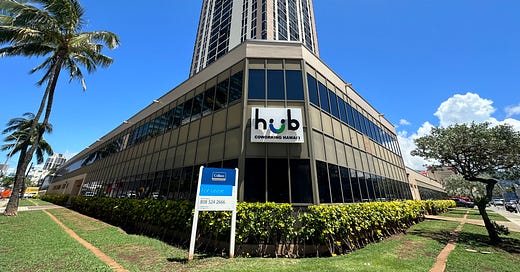



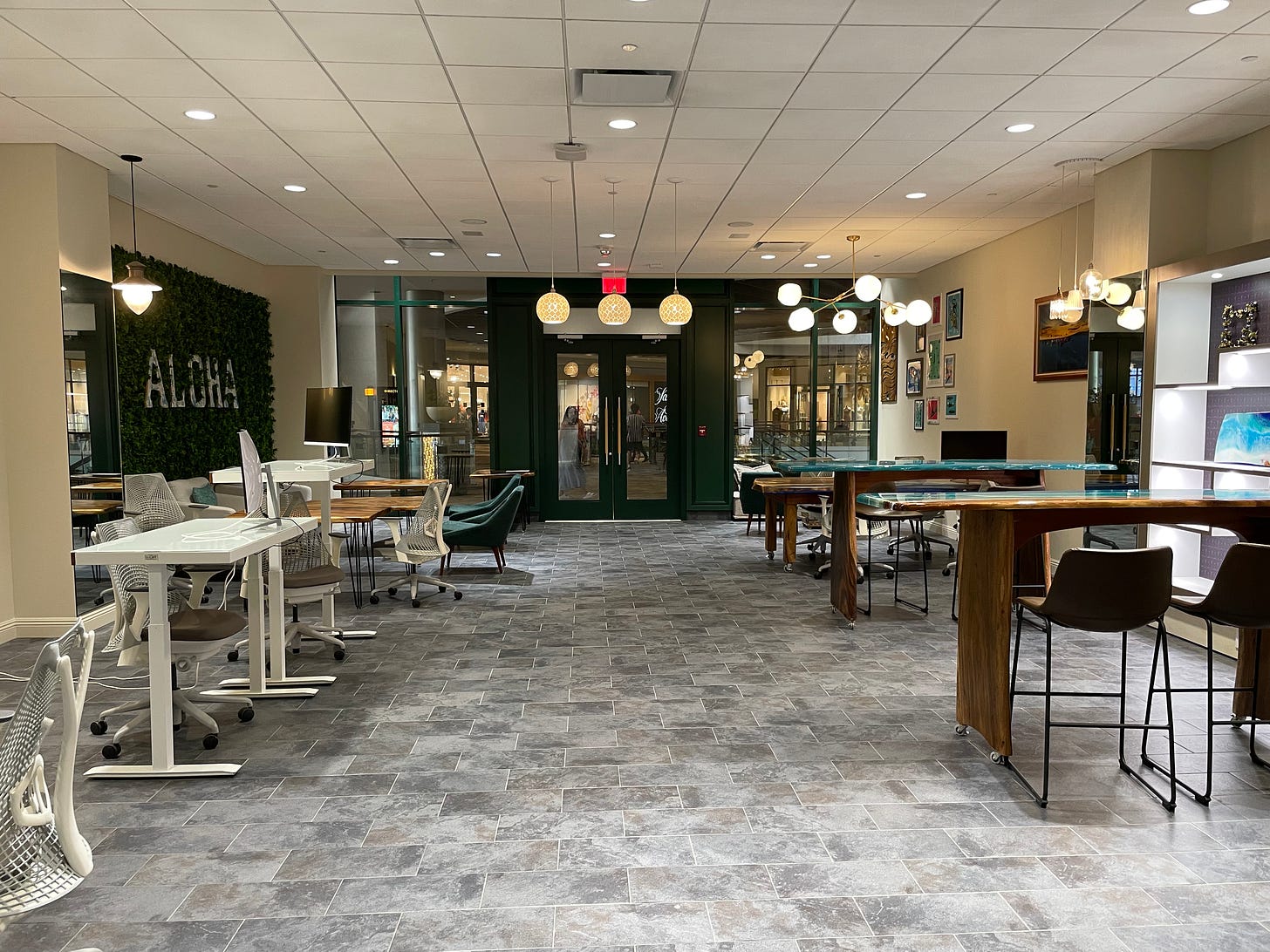
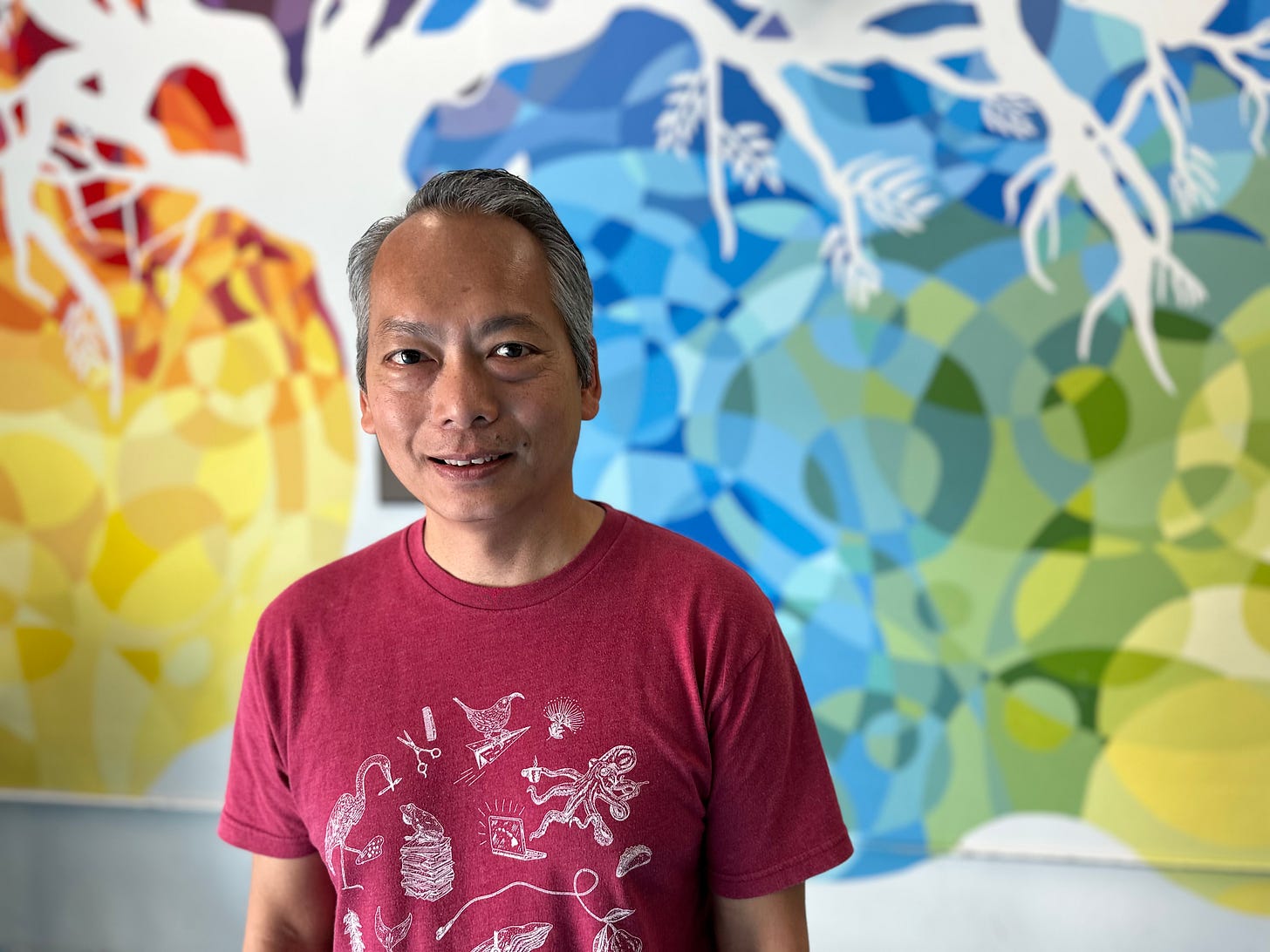


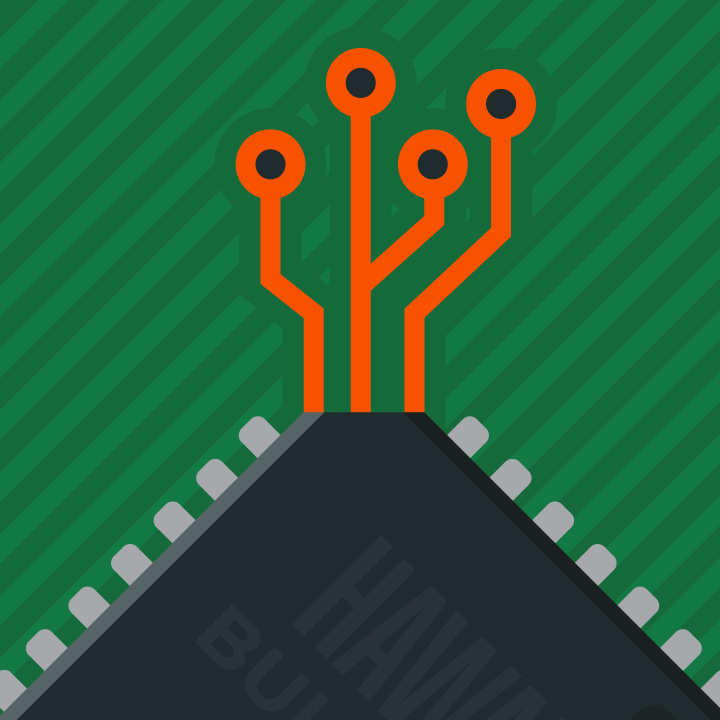
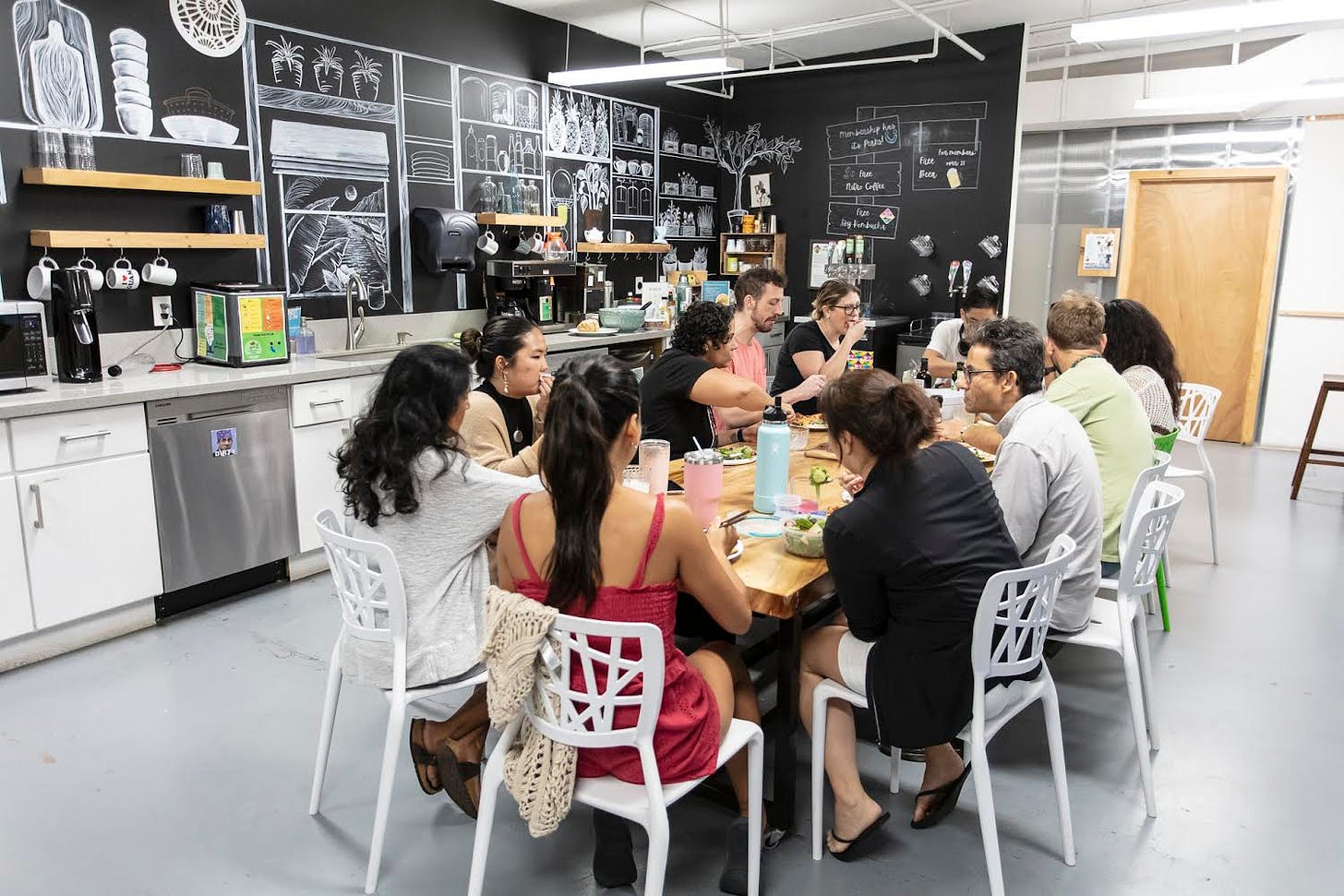
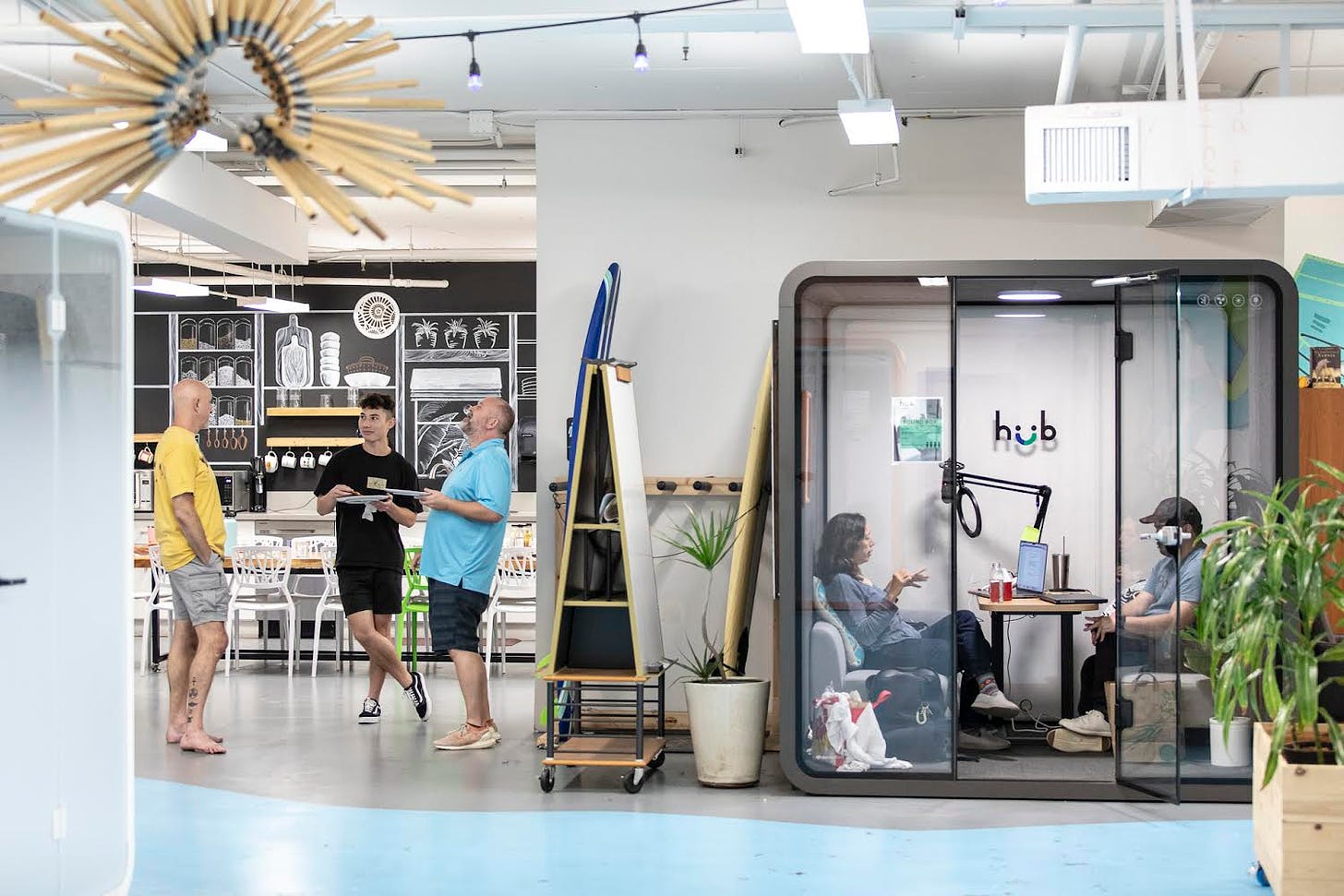
My wife and I used a quasi co-working space at Pacific Guardian Center for about a year 2020-2021. It was basically an office with shared wifi, kitchen and conference room. We lived in a 2br condo across the street, so parking wasn't an issue. We had run out of space trying to work from home with a toddler and au pair. The people were super nice and helpful and it was a good experience, but it also seemed like they treated all the offices with the same policies and all as the other expansive offices- so it didn't exactly cater to a "co-worker's" need.
Great article, keep it up! 🤙